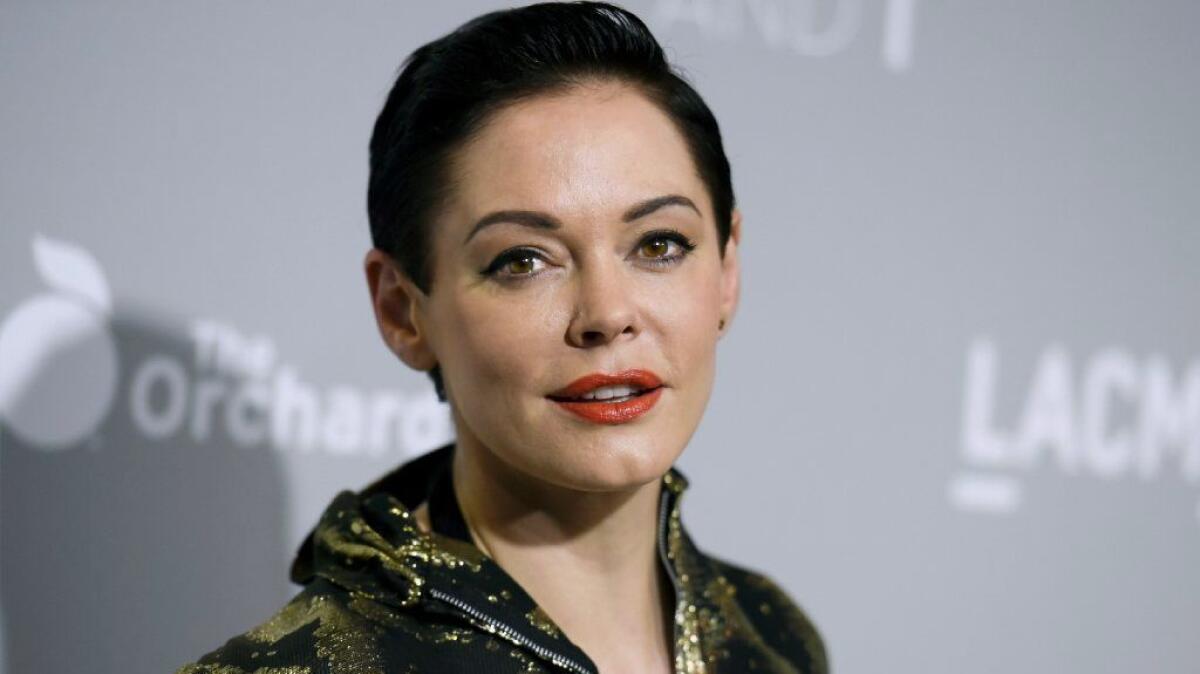With Rose McGowan’s suspension, Twitter again concedes it stumbled

- Share via
Twitter’s moderation team has been tested in recent weeks by three high-profile cases.
- An actress-turned-activist suspended for tweeting a private phone number.
- A politician whose anti-abortion campaign ad Twitter censored, and then released in full.
- A president whose account Twitter declined to suspend despite accusations he was violating company rules by goading an adversary into a nuclear war.
Though Twitter’s action differed in each case, the incidents all had one thing in common. Each time, Twitter wound up second-guessing itself.
Such back-tracking is increasingly common from the San Francisco social media platform, which after years of defining itself as an outlet for free speech is now getting more attention for its attempts — and sometimes its failures — to limit speech on its platform.
The most recent controversy began Wednesday when Twitter temporarily banned actress Rose McGowan after a string of tweets about disgraced Hollywood mogul Harvey Weinstein.
McGowan, an actress best known for her appearance in the TV series “Charmed,” has been publicly lambasting Weinstein ever since the New York Times published a report last week detailing decades of sexual harassment by the studio head.
McGowan, who was named in the article as one of Weinstein’s victims, has also singled out members of the entertainment industry she accused of being complicit with Weinstein, including actor Ben Affleck and Amazon CEO Jeff Bezos.
News of her banishment first appeared on McGowan’s Instagram account, where she shared a message from Twitter saying she had violated the platform’s rules. “Twitter has suspended me,” McGowan wrote in Instagram. “There are powerful forces at work. Be my voice.”
Hours later, Twitter published a message saying it had suspended the actress because one of her tweets included a private phone number. Soon after, that tweet was removed and the company reinstated her account.
But the platform was roundly criticized for the temporary ban, fanning accusations that its enforcement of rules is arbitrary and ineffective at tackling trolls, one of Twitter’s most enduring problems.
Why, for instance, was McGowan banned for posting a phone number, but not Fox Business Network anchor Lou Dobbs, who once tweeted the address and phone number of Jessica Leeds, a woman who came forward last year to accuse Trump of groping her?
The inconsistent approach has raised questions about whether Twitter’s leadership — which has admitted shortcomings in tackling abuse — has the gumption to manage a platform as rancorous as theirs.
As a platform, Twitter is not liable for most of the content on its network. But it keeps in place rules, known as terms of service, to prevent the most egregious and illegal behavior such as death threats and child pornography.
Twitter leaders have described the company as “the free speech wing of the free speech party,” illustrating the company’s pride in its hands-off approach to moderation. This commitment to free speech has been credited in helping spread grass-roots democratic movements such as the Arab Spring, and it’s the reason Twitter is banned in autocratic countries such as China.
But in recent years, critics have said the laissez-faire approach has turned Twitter into a hotbed of harassment — a problem Jack Dorsey, the company’s co-fouder and chief executive, has pledged to fix through increased moderation.
Twitter can use algorithms to flag violations, but it also relies on users and employees to identify and then remove abusive content. That can be unwieldy given the hundreds of millions of tweets sent each day.
“There’s always going to be the subjective side with people who review content and they interpret rules. You can’t expect it to be like an algorithm, which also makes mistakes,” said Karen Kovacs North, an expert in social media and a communications professor at USC.
“But if you put a private phone number out there, that’s not subjective. You’ve violated the rules,” she added.
But what exactly are the rules? At times, Twitter itself doesn’t appear particularly sure.
The McGowan dust-up comes just days after Twitter censored a video ad from Rep. Marsha Blackburn, a staunch anti-abortion advocate, because it included a statement about the sale of fetal tissue for medical research that the company deemed inflammatory. A day later, Twitter flip-flopped and said it would allow Blackburn to promote the video “after further review” by the company.
Few examples embody Twitter’s elastic policies more than its treatment of President Trump. Though critics say Twitter would be hard-pressed to find a more clear example of a violation of its rule against inciting violence than Trump’s tweets about North Korea, the president has been allowed to remain on his platform of choice. Twitter pointed to a criterion it calls “newsworthiness” — a factor not previously cited publicly by the company as playing a role in moderation decisions.
“We hold all accounts to the same rules, and consider a number of factors when assessing whether Tweets violate our rules,” the company said last month in response to calls to have Trump banned.
“Among the considerations is ‘newsworthiness’ and whether a Tweet is of public interest,” the company tweeted from its Public Policy account. “This has long been internal policy and we’ll soon update our public-facing rules to reflect it. We need to do better on this, and will.”
In all three instances — McGowan, Blackburn and Trump — the company made a public statement acknowledging it could have handled the situation better.
“We need to be a lot more transparent in our actions in order to build trust,” Dorsey tweeted Thursday.
But many Twitter users saw a double standard in the treatment of the high-profile tweeters, who reminded the company that abuse and trolling remains rampant.
McGowan could not be reached for comment.
The actress reached a $100,000 settlement with Weinstein in 1997 after an alleged incident inside a hotel room at the Sundance Film Festival.
Twitter did not respond to a request for comment. But in a tweet Thursday, Dorsey suggested his company was not enforcing rules arbitrarily, it was just failing to show the public it was acting fairly.
“We do need to do a better job at showing that we are not selectively applying rules,” he wrote.
Follow me @dhpierson on Twitter
More to Read
Inside the business of entertainment
The Wide Shot brings you news, analysis and insights on everything from streaming wars to production — and what it all means for the future.
You may occasionally receive promotional content from the Los Angeles Times.











